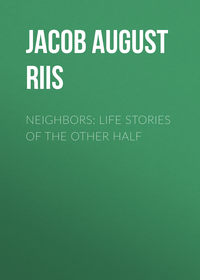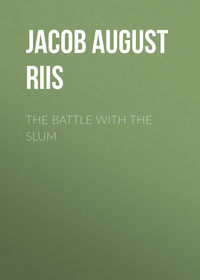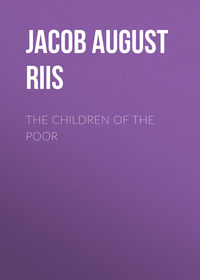 полная версия
полная версияHow the Other Half Lives: Studies Among the Tenements of New York
Of all the temptations that beset him, the one that troubles him and the police most is his passion for gambling. The game of policy is a kind of unlawful penny lottery specially adapted to his means, but patronized extensively by poor white players as well. It is the meanest of swindles, but reaps for its backers rich fortunes wherever colored people congregate. Between the fortune-teller and the policy shop, closely allied frauds always, the wages of many a hard day’s work are wasted by the negro; but the loss causes him few regrets. Penniless, but with undaunted faith in his ultimate “luck,” he looks forward to the time when he shall once more be able to take a hand at “beating policy.” When periodically the negro’s lucky numbers, 4-11-44, come out on the slips of the alleged daily drawings, that are supposed to be held in some far-off Western town, intense excitement reigns in Thompson Street and along the Avenue, where someone is always the winner. An immense impetus is given then to the bogus business that has no existence outside of the cigar stores and candy shops where it hides from the law, save in some cunning Bowery “broker’s” back office, where the slips are printed and the “winnings” apportioned daily with due regard to the backer’s interests.
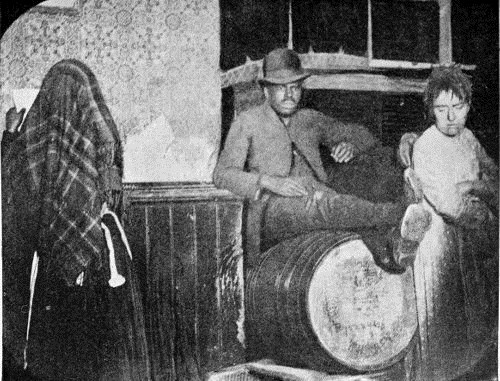
A BLACK-AND-TAN DIVE IN “AFRICA.”
It is a question whether “Africa” has been improved by the advent of the Italian, with the tramp from the Mulberry Street Bend in his train. The moral turpitude of Thompson Street has been notorious for years, and the mingling of the three elements does not seem to have wrought any change for the better. The borderland where the white and black races meet in common debauch, the aptly-named black-and-tan saloon, has never been debatable ground from a moral stand-point. It has always been the worst of the desperately bad. Than this commingling of the utterly depraved of both sexes, white and black, on such ground, there can be no greater abomination. Usually it is some foul cellar dive, perhaps run by the political “leader” of the district, who is “in with” the police. In any event it gathers to itself all the law-breakers and all the human wrecks within reach. When a fight breaks out during the dance a dozen razors are handy in as many boot-legs, and there is always a job for the surgeon and the ambulance. The black “tough” is as handy with the razor in a fight as his peaceably inclined brother is with it in pursuit of his honest trade. As the Chinaman hides his knife in his sleeve and the Italian his stiletto in the bosom, so the negro goes to the ball with a razor in his boot-leg, and on occasion does as much execution with it as both of the others together. More than three-fourths of the business the police have with the colored people in New York arises in the black-and-tan district, now no longer fairly representative of their color.
I have touched briefly upon such facts in the negro’s life as may serve to throw light on the social condition of his people in New York. If, when the account is made up between the races, it shall be claimed that he falls short of the result to be expected from twenty-five years of freedom, it may be well to turn to the other side of the ledger and see how much of the blame is borne by the prejudice and greed that have kept him from rising under a burden of responsibility to which he could hardly be equal. And in this view he may be seen to have advanced much farther and faster than before suspected, and to promise, after all, with fair treatment, quite as well as the rest of us, his white-skinned fellow-citizens, had any right to expect.
CHAPTER XIV.
THE COMMON HERD
There is another line not always so readily drawn in the tenements, yet the real boundary line of the Other Half: the one that defines the “flat.” The law does not draw it at all, accounting all flats tenements without distinction. The health officer draws it from observation, lumping all those which in his judgment have nothing, or not enough, to give them claim upon the name, with the common herd, and his way is, perhaps, on the whole, the surest and best. The outside of the building gives no valuable clew. Brass and brown-stone go well sometimes with dense crowds and dark and dingy rooms; but the first attempt to enter helps draw the line with tolerable distinctness. A locked door is a strong point in favor of the flat. It argues that the first step has been taken to secure privacy, the absence of which is the chief curse of the tenement. Behind a locked door the hoodlum is not at home, unless there be a jailor in place of a janitor to guard it. Not that the janitor and the door-bell are infallible. There may be a tenement behind a closed door; but never a “flat” without it. The hall that is a highway for all the world by night and by day is the tenement’s proper badge. The Other Half ever receives with open doors.
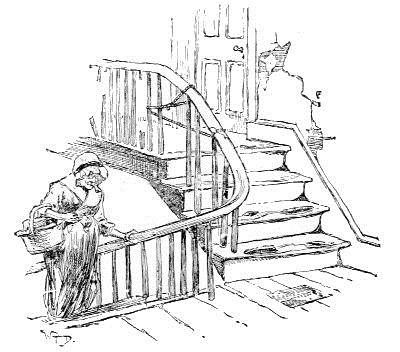
THE OPEN DOOR.
With this introduction we shall not seek it long anywhere in the city. Below Houston Street the door-bell in our age is as extinct as the dodo. East of Second Avenue, and west of Ninth Avenue as far up as the Park, it is practically an unknown institution. The nearer the river and the great workshops the more numerous the tenements. The kind of work carried on in any locality to a large extent determines their character. Skilled and well-paid labor puts its stamp on a tenement even in spite of the open door, and usually soon supplies the missing bell. Gas-houses, slaughter-houses and the docks, that attract the roughest crowds and support the vilest saloons, invariably form slum-centres. The city is full of such above the line of Fourteenth Street, that is erroneously supposed by some to fence off the good from the bad, separate the chaff from the wheat. There is nothing below that line that can outdo in wickedness Hell’s Kitchen, in the region of three-cent whiskey, or its counterpoise at the other end of Thirty-ninth Street, on the East River, the home of the infamous Rag Gang. Cherry Street is not “tougher” than Battle Row in East Sixty-third Street, or “the village” at Twenty-ninth Street and First Avenue, where stores of broken bricks, ammunition for the nightly conflicts with the police, are part of the regulation outfit of every tenement. The Mulberry Street Bend is scarce dirtier than Little Italy in Harlem. Even across the Harlem River, Frog Hollow challenges the admiration of the earlier slums for the boldness and pernicious activity of its home gang. There are enough of these sore spots. We shall yet have occasion to look into the social conditions of some of them; were I to draw a picture of them here as they are, the subject, I fear, would outgrow alike the limits of this book and the reader’s patience.
It is true that they tell only one side of the story; that there is another to tell. A story of thousands of devoted lives, laboring earnestly to make the most of their scant opportunities for good; of heroic men and women striving patiently against fearful odds and by their very courage coming off victors in the battle with the tenement; of womanhood pure and undefiled. That it should blossom in such an atmosphere is one of the unfathomable mysteries of life. And yet it is not an uncommon thing to find sweet and innocent girls, singularly untouched by the evil around them, true wives and faithful mothers, literally “like jewels in a swine’s snout,” in the worst of the infamous barracks. It is the experience of all who have intelligently observed this side of life in a great city, not to be explained—unless on the theory of my friend, the priest in the Mulberry Street Bend, that inherent purity revolts instinctively from the naked brutality of vice as seen in the slums—but to be thankfully accepted as the one gleam of hope in an otherwise hopeless desert.
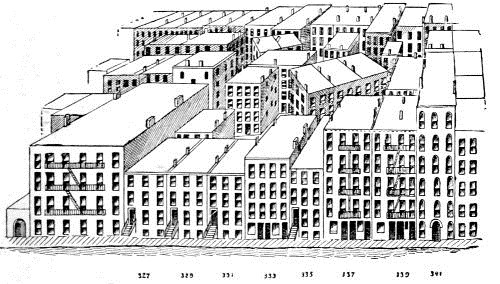
BIRD’S-EYE VIEW of AN EAST SIDE TENEMENT BLOCK. (FROM A DRAWING BY CHARLES F. WINGATE, ESQ.)
But the relief is not great. In the dull content of life bred on the tenement-house dead level there is little to redeem it, or to calm apprehension for a society that has nothing better to offer its toilers; while the patient efforts of the lives finally attuned to it to render the situation tolerable, and the very success of these efforts, serve only to bring out in stronger contrast the general gloom of the picture by showing how much farther they might have gone with half a chance. Go into any of the “respectable” tenement neighborhoods—the fact that there are not more than two saloons on the corner, nor over three or four in the block will serve as a fair guide—where live the great body of hard-working Irish and German immigrants and their descendants, who accept naturally the conditions of tenement life, because for them there is nothing else in New York; be with and among its people until you understand their ways, their aims, and the quality of their ambitions, and unless you can content yourself with the scriptural promise that the poor we shall have always with us, or with the menagerie view that, if fed, they have no cause of complaint, you shall come away agreeing with me that, humanly speaking, life there does not seem worth the living. Take at random one of these uptown tenement blocks, not of the worst nor yet of the most prosperous kind, within hail of what the newspapers would call a “fine residential section.” These houses were built since the last cholera scare made people willing to listen to reason. The block is not like the one over on the East Side in which I actually lost my way once. There were thirty or forty rear houses in the heart of it, three or four on every lot, set at all sorts of angles, with odd, winding passages, or no passage at all, only “runways” for the thieves and toughs of the neighborhood. These yards are clear. There is air there, and it is about all there is. The view between brick walls outside is that of a stony street; inside, of rows of unpainted board fences, a bewildering maze of clothes-posts and lines; underfoot, a desert of brown, hard-baked soil from which every blade of grass, every stray weed, every speck of green, has been trodden out, as must inevitably be every gentle thought and aspiration above the mere wants of the body in those whose moral natures such home surroundings are to nourish. In self-defence, you know, all life eventually accommodates itself to its environment, and human life is no exception. Within the house there is nothing to supply the want thus left unsatisfied. Tenement-houses have no æsthetic resources. If any are to be brought to bear on them, they must come from the outside. There is the common hall with doors opening softly on every landing as the strange step is heard on the stairs, the air-shaft that seems always so busy letting out foul stenches from below that it has no time to earn its name by bringing down fresh air, the squeaking pumps that hold no water, and the rent that is never less than one week’s wages out of the four, quite as often half of the family earnings.
Why complete the sketch? It is drearily familiar already. Such as it is, it is the frame in which are set days, weeks, months, and years of unceasing toil, just able to fill the mouth and clothe the back. Such as it is, it is the world, and all of it, to which these weary workers return nightly to feed heart and brain after wearing out the body at the bench, or in the shop. To it come the young with their restless yearnings, perhaps to pass on the threshold one of the daughters of sin, driven to the tenement by the police when they raided her den, sallying forth in silks and fine attire after her day of idleness. These in their coarse garments—girls with the love of youth for beautiful things, with this hard life before them—who shall save them from the tempter? Down in the street the saloon, always bright and gay, gathering to itself all the cheer of the block, beckons the boys. In many such blocks the census-taker found two thousand men, women, and children, and over, who called them home.
The picture is faithful enough to stand for its class wherever along both rivers the Irish brogue is heard. As already said, the Celt falls most readily victim to tenement influences since shanty-town and its original free-soilers have become things of the past. If he be thrifty and shrewd his progress thenceforward is along the plane of the tenement, on which he soon assumes to manage without improving things. The German has an advantage over his Celtic neighbor in his strong love for flowers, which not all the tenements on the East Side have power to smother. His garden goes with him wherever he goes. Not that it represents any high moral principle in the man; rather perhaps the capacity for it. He turns his saloon into a shrubbery as soon as his back-yard. But wherever he puts it in a tenement block it does the work of a dozen police clubs. In proportion as it spreads the neighborhood takes on a more orderly character. As the green dies out of the landscape and increases in political importance, the police find more to do. Where it disappears altogether from sight, lapsing into a mere sentiment, police-beats are shortened and the force patrols double at night. Neither the man nor the sentiment is wholly responsible for this. It is the tenement unadorned that is. The changing of Tompkins Square from a sand lot into a beautiful park put an end for good and all to the Bread and Blood riots of which it used to be the scene, and transformed a nest of dangerous agitators into a harmless, beer-craving band of Anarchists. They have scarcely been heard of since. Opponents of the small parks system as a means of relieving the congested population of tenement districts, please take note.
With the first hot nights in June police despatches, that record the killing of men and women by rolling off roofs and window-sills while asleep, announce that the time of greatest suffering among the poor is at hand. It is in hot weather, when life indoors is well-nigh unbearable with cooking, sleeping, and working, all crowded into the small rooms together, that the tenement expands, reckless of all restraint. Then a strange and picturesque life moves upon the flat roofs. In the day and early evening mothers air their babies there, the boys fly their kites from the house-tops, undismayed by police regulations, and the young men and girls court and pass the growler. In the stifling July nights, when the big barracks are like fiery furnaces, their very walls giving out absorbed heat, men and women lie in restless, sweltering rows, panting for air and sleep. Then every truck in the street, every crowded fire-escape, becomes a bedroom, infinitely preferable to any the house affords. A cooling shower on such a night is hailed as a heaven-sent blessing in a hundred thousand homes.
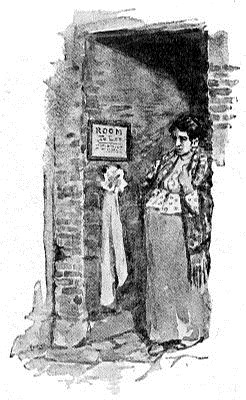
Life in the tenements in July and August spells death to an army of little ones whom the doctor’s skill is powerless to save. When the white badge of mourning flutters from every second door, sleepless mothers walk the streets in the gray of the early dawn, trying to stir a cooling breeze to fan the brow of the sick baby. There is no sadder sight than this patient devotion striving against fearfully hopeless odds. Fifty “summer doctors,” especially trained to this work, are then sent into the tenements by the Board of Health, with free advice and medicine for the poor. Devoted women follow in their track with care and nursing for the sick. Fresh-air excursions run daily out of New York on land and water; but despite all efforts the grave-diggers in Calvary work over-time, and little coffins are stacked mountains high on the deck of the Charity Commissioners’ boat when it makes its semi-weekly trips to the city cemetery.
Under the most favorable circumstances, an epidemic, which the well-to-do can afford to make light of as a thing to be got over or avoided by reasonable care, is excessively fatal among the children of the poor, by reason of the practical impossibility of isolating the patient in a tenement. The measles, ordinarily a harmless disease, furnishes a familiar example. Tread it ever so lightly on the avenues, in the tenements it kills right and left. Such an epidemic ravaged three crowded blocks in Elizabeth Street on the heels of the grippe last winter, and, when it had spent its fury, the death-maps in the Bureau of Vital Statistics looked as if a black hand had been laid across those blocks, over-shadowing in part the contiguous tenements in Mott Street, and with the thumb covering a particularly packed settlement of half a dozen houses in Mulberry Street. The track of the epidemic through these teeming barracks was as clearly defined as the track of a tornado through a forest district. There were houses in which as many as eight little children had died in five months. The records showed that respiratory diseases, the common heritage of the grippe and the measles, had caused death in most cases, discovering the trouble to be, next to the inability to check the contagion in those crowds, in the poverty of the parents and the wretched home conditions that made proper care of the sick impossible. The fact was emphasized by the occurrence here and there of a few isolated deaths from diphtheria and scarlet fever. In the case of these diseases, considered more dangerous to the public health, the health officers exercised summary powers of removal to the hospital where proper treatment could be had, and the result was a low death-rate.
These were tenements of the tall, modern type. A little more than a year ago, when a census was made of the tenements and compared with the mortality tables, no little surprise and congratulation was caused by the discovery that as the buildings grew taller the death-rate fell. The reason is plain, though the reverse had been expected by most people. The biggest tenements have been built in the last ten years of sanitary reform rule, and have been brought, in all but the crowding, under its laws. The old houses that from private dwellings were made into tenements, or were run up to house the biggest crowds in defiance of every moral and physical law, can be improved by no device short of demolition. They will ever remain the worst.
That ignorance plays its part, as well as poverty and bad hygienic surroundings, in the sacrifice of life is of course inevitable. They go usually hand in hand. A message came one day last spring summoning me to a Mott Street tenement in which lay a child dying from some unknown disease. With the “charity doctor” I found the patient on the top floor, stretched upon two chairs in a dreadfully stifling room. She was gasping in the agony of peritonitis that had already written its death-sentence on her wan and pinched face. The whole family, father, mother, and four ragged children, sat around looking on with the stony resignation of helpless despair that had long since given up the fight against fate as useless. A glance around the wretched room left no doubt as to the cause of the child’s condition. “Improper nourishment,” said the doctor, which, translated to suit the place, meant starvation. The father’s hands were crippled from lead poisoning. He had not been able to work for a year. A contagious disease of the eyes, too long neglected, had made the mother and one of the boys nearly blind. The children cried with hunger. They had not broken their fast that day, and it was then near noon. For months the family had subsisted on two dollars a week from the priest, and a few loaves and a piece of corned beef which the sisters sent them on Saturday. The doctor gave direction for the treatment of the child, knowing that it was possible only to alleviate its sufferings until death should end them, and left some money for food for the rest. An hour later, when I returned, I found them feeding the dying child with ginger ale, bought for two cents a bottle at the pedlar’s cart down the street. A pitying neighbor had proposed it as the one thing she could think of as likely to make the child forget its misery. There was enough in the bottle to go round to the rest of the family. In fact, the wake had already begun; before night it was under way in dead earnest.
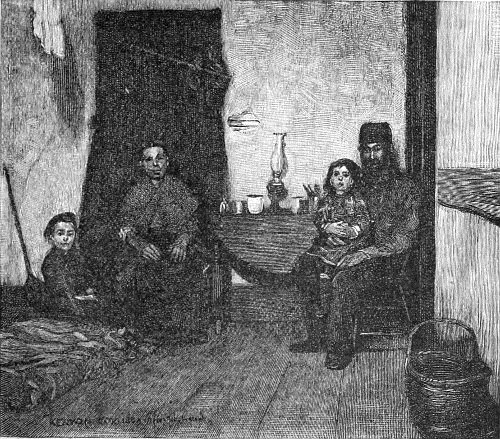
IN POVERTY GAP, WEST TWENTY-EIGHTH ST. AN ENGLISH COAL-HEAVER’S HOME. 17
Every once in a while a case of downright starvation gets into the newspapers and makes a sensation. But this is the exception. Were the whole truth known, it would come home to the community with a shock that would rouse it to a more serious effort than the spasmodic undoing of its purse-strings. I am satisfied from my own observation that hundreds of men, women, and children are every day slowly starving to death in the tenements with my medical friend’s complaint of “improper nourishment.” Within a single week I have had this year three cases of insanity, provoked directly by poverty and want. One was that of a mother who in the middle of the night got up to murder her child, who was crying for food; another was the case of an Elizabeth Street truck-driver whom the newspapers never heard of. With a family to provide for, he had been unable to work for many months. There was neither food, nor a scrap of anything upon which money could be raised, left in the house; his mind gave way under the combined physical and mental suffering. In the third case I was just in time with the police to prevent the madman from murdering his whole family. He had the sharpened hatchet in his pocket when we seized him. He was an Irish laborer, and had been working in the sewers until the poisonous gases destroyed his health. Then he was laid off, and scarcely anything had been coming in all winter but the oldest child’s earnings as cash-girl in a store, $2.50 a week. There were seven children to provide for, and the rent of the Mulberry Street attic in which the family lived was $10 a month. They had borrowed as long as anybody had a cent to lend. When at last the man got an odd job that would just buy the children bread, the week’s wages only served to measure the depth of their misery. “It came in so on the tail-end of everything,” said his wife in telling the story, with unconscious eloquence. The outlook worried him through sleepless nights until it destroyed his reason. In his madness he had only one conscious thought: that the town should not take the children. “Better that I take care of them myself,” he repeated to himself as he ground the axe to an edge. Help came in abundance from many almost as poor as they when the desperate straits of the family became known through his arrest. The readiness of the poor to share what little they have with those who have even less is one of the few moral virtues of the tenements. Their enormous crowds touch elbow in a closeness of sympathy that is scarcely to be understood out of them, and has no parallel except among the unfortunate women whom the world scorns as outcasts. There is very little professed sentiment about it to draw a sentimental tear from the eye of romantic philanthropy. The hard fact is that the instinct of self-preservation impels them to make common cause against the common misery.
No doubt intemperance bears a large share of the blame for it; judging from the stand-point of the policeman perhaps the greater share. Two such entries as I read in the police returns on successive days last March, of mothers in West Side tenements, who, in their drunken sleep, lay upon and killed their infants, go far to support such a position. And they are far from uncommon. But my experience has shown me another view of it, a view which the last report of the Society for Improving the Condition of the Poor seems more than half inclined to adopt in allotting to “intemperance the cause of distress, or distress the cause of intemperance,” forty per cent. of the cases it is called upon to deal with. Even if it were all true, I should still load over upon the tenement the heaviest responsibility. A single factor, the scandalous scarcity of water in the hot summer when the thirst of the million tenants must be quenched, if not in that in something else, has in the past years more than all other causes encouraged drunkenness among the poor. But to my mind there is a closer connection between the wages of the tenements and the vices and improvidence of those who dwell in them than, with the guilt of the tenement upon our heads, we are willing to admit even to ourselves. Weak tea with a dry crust is not a diet to nurse moral strength. Yet how much better might the fare be expected to be in the family of this “widow with seven children, very energetic and prudent”—I quote again from the report of the Society for the Improvement of the Condition of the Poor—whose “eldest girl was employed as a learner in a tailor’s shop at small wages, and one boy had a place as ‘cash’ in a store. There were two other little boys who sold papers and sometimes earned one dollar. The mother finishes pantaloons and can do three pairs in a day, thus earning thirty-nine cents. Here is a family of eight persons with rent to pay and an income of less than six dollars a week.”






